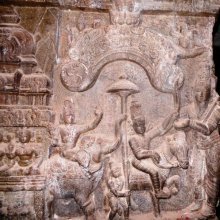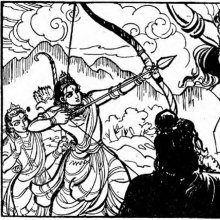Tataka, Taṭaka: 17 definitions
Introduction:
Tataka means something in Hinduism, Sanskrit, Marathi, Hindi. If you want to know the exact meaning, history, etymology or English translation of this term then check out the descriptions on this page. Add your comment or reference to a book if you want to contribute to this summary article.
Images (photo gallery)
In Hinduism
Purana and Itihasa (epic history)
Source: archive.org: Puranic EncyclopediaTāṭakā (ताटका).—A fierce demoness. It was because of a curse of the sage Agastya that Tāṭakā became a demoness.
There was once a great Yakṣa named Suketu, a son of Surakṣa. He did penance to propitiate Brahmā to get a child and by the blessing of Brahmā Suketu got a daughter named Tāṭakā. Brahmā gave her the strength of a thousand elephants. Taṭakā was by nature interested in cruel and violent deeds and doing deeds of magic. She made Sunda, son of Jharjha, her husband. She got two sons named Mārīca and Subāhu. They also became mighty ones great in deeds by magic.
Once Sunda attacked the āśrama of Agastya in a mood of intoxicated arrogance. Sunda was burnt to death in the fire of his fury. Tāṭakā coming to know of the death of her husband got angry and attacked the āśrama of Agastya with her sons. Agastya cursed them and made them into demons. Tāṭakā and her sons who immediately turned themselves into fierce-looking demons went first to Pātāla with Sumālī, father of the demon race and then went with Rāvaṇa, King of the demons, to Laṅkā and stayed there. With the help of Rāvaṇa, Tāṭakā conquered the great deep forest near Kārūṣa and stayed there with her sons. None, devas, demons or men, dared to step into that forest. Even the Sun or Clouds avoided passing above that forest.
It was at that time that Śrī Rāma and Lakṣmaṇa came to that forest with Viśvāmitra. Tāṭakā attacked Śrī Rāma and Rāma killed her with one arrow. The heavy body of the demoness fell to the ground like a big mountain. Her soul then rose up as a beautiful Gandharva lady and Tāṭakā who was thus released from the curse praised Śrī Rāma and left the place. Chapters 24 to 26 of Bāla Kāṇḍa, Vālmīki Rāmāyaṇa and Kamba Rāmāyaṇa).

The Purana (पुराण, purāṇas) refers to Sanskrit literature preserving ancient India’s vast cultural history, including historical legends, religious ceremonies, various arts and sciences. The eighteen mahapuranas total over 400,000 shlokas (metrical couplets) and date to at least several centuries BCE.
Shaktism (Shakta philosophy)
Source: Google Books: ManthanabhairavatantramTaṭāka (तटाक) refers to a “pool”, according to the Ambāmatasaṃhitā (verse 8.88cd-94a).—Accordingly, “There is a certain tamarind (on the banks of a) pool (taṭāka) in (the city of) Candrapūryaka. Surrounded by Vetālas, one should know it to be Aṃvilī by name. Once felled with (magic) pellets, (he) grasped (the maṇḍala which is) the hermitage of authority forever. (Thus) Śrīnātha was first called Ciñcinin in the teaching of the three lineages by virtue of the power of (the goddess’s) intense Command. [...]”.

Shakta (शाक्त, śākta) or Shaktism (śāktism) represents a tradition of Hinduism where the Goddess (Devi) is revered and worshipped. Shakta literature includes a range of scriptures, including various Agamas and Tantras, although its roots may be traced back to the Vedas.
Ayurveda (science of life)
Toxicology (Study and Treatment of poison)
Source: Shodhganga: Kasyapa Samhita—Text on Visha ChikitsaTaṭāka (तटाक) is the name of an ingredient used in the treatment (cikitsā) of rat poison (ākhu-viṣa), according to the Kāśyapa Saṃhitā: an ancient Sanskrit text from the Pāñcarātra tradition dealing with both Tantra and Viṣacikitsā—an important topic from Āyurveda which deals with the study of Toxicology (Viṣavidyā or Sarpavidyā).—Kāśyapa has recommended a slew of generic formulae that successfully neutralise rat poison.—According to Kāśyapasaṃhitā (verse 11.53): “A measure or khāri of the root of Carvā destroys rat poison. The oil prepared from the bark of Taṭāka and the root of sira also make a medicine”.

Āyurveda (आयुर्वेद, ayurveda) is a branch of Indian science dealing with medicine, herbalism, taxology, anatomy, surgery, alchemy and related topics. Traditional practice of Āyurveda in ancient India dates back to at least the first millenium BC. Literature is commonly written in Sanskrit using various poetic metres.
General definition (in Hinduism)
Source: Apam Napat: Indian MythologyTataka was a shape-shifting Yaksha woman, the mother of the demons Subahu and Maricha. She was the daughter of a Yaksha named Suketu, who obtained her by performing a penance directed to Lord Brahma. Suketu had desired a son, but Brahma gave his daughter the strength of a thousand elephants instead.
Languages of India and abroad
Marathi-English dictionary
Source: DDSA: The Molesworth Marathi and English Dictionarytaṭakā (तटका).—a P Fresh--a fruit, flower, vegetable, water.
--- OR ---
taṭāka (तटाक).—m S The bank of a river. 2 n A small tank or pond.
--- OR ---
tāṭakā (ताटका).—f (S The name of the sister of rāvaṇa) A vixen, virago, shrew, a Xanthippe. Applied also to a female considered as monstrous and hideous.
Source: DDSA: The Aryabhusan school dictionary, Marathi-Englishtaṭāka (तटाक).—m The bank of a river. n A small tank.
--- OR ---
tāṭakā (ताटका).—f The name of the sister of rāvaṇa A vixen.
Marathi is an Indo-European language having over 70 million native speakers people in (predominantly) Maharashtra India. Marathi, like many other Indo-Aryan languages, evolved from early forms of Prakrit, which itself is a subset of Sanskrit, one of the most ancient languages of the world.
Sanskrit dictionary
Source: DDSA: The practical Sanskrit-English dictionaryTaṭaka (तटक).—A shore or bank.
Derivable forms: taṭakam (तटकम्).
--- OR ---
Taṭāka (तटाक).—A pond (deep enough for the lotus and other aquatic plants); See तडाग (taḍāga).
Derivable forms: taṭākaḥ (तटाकः), taṭākam (तटाकम्).
Source: Cologne Digital Sanskrit Dictionaries: Edgerton Buddhist Hybrid Sanskrit DictionaryTātaka (तातक) or Tātuka or Tāttaka.—all = tattaka (§ 3.2), so much, so great, pl. so many; no such forms are recorded elsewhere; tātaka, only as v.l. of Kashgar recension of Saddharmapuṇḍarīka for tattaka, q.v.; tāttaka, m. pl., Samādhirājasūtra 19.16 (verse); Kāśyapa Parivarta 158.3 (prose; twice); 159.5 ff. (prose); tātuka, correl. with yātuka, q.v., Śikṣāsamuccaya 346.16 (verse); Gaṇḍavyūha 487.17 (here the correl. in 1st ed. is spelled yātaka, in 2d. ed. yātuka) and 18 (verses).
Source: Cologne Digital Sanskrit Dictionaries: Shabda-Sagara Sanskrit-English DictionaryTaṭāka (तटाक).—m.
(-kaḥ) A pond deep enough for the lotus and other aquatic flowers. E. taṭa a band, and ak to go, affix ac; or taṭa-ākan also taḍāka; also tāṭāka and taṭīka.
Source: Cologne Digital Sanskrit Dictionaries: Benfey Sanskrit-English DictionaryTaṭāka (तटाक).—[taṭā + ka], cf. taṭa, m. and n. A pond, [Rāmāyaṇa] 2, 68, 19.
Source: Cologne Digital Sanskrit Dictionaries: Cappeller Sanskrit-English DictionaryTaṭāka (तटाक).—[neuter] pond, lake, poss. kin; [feminine] kinī a large lake.
Source: Cologne Digital Sanskrit Dictionaries: Monier-Williams Sanskrit-English Dictionary1) Taṭaka (तटक):—[from taṭa] n. a shore, [Inscriptions]
2) Taṭāka (तटाक):—[from taṭa] n. (m., [cf. Lexicographers, esp. such as amarasiṃha, halāyudha, hemacandra, etc.]) a pool, [ṢaḍvBr. v, 12; Rāmāyaṇa etc.]
Source: Cologne Digital Sanskrit Dictionaries: Yates Sanskrit-English DictionaryTaṭāka (तटाक):—[taṭā+ka] (kaḥ) 1. m. A pond deep enough for lotuses, &c.
[Sanskrit to German]
Sanskrit, also spelled संस्कृतम् (saṃskṛtam), is an ancient language of India commonly seen as the grandmother of the Indo-European language family (even English!). Closely allied with Prakrit and Pali, Sanskrit is more exhaustive in both grammar and terms and has the most extensive collection of literature in the world, greatly surpassing its sister-languages Greek and Latin.
Hindi dictionary
Source: DDSA: A practical Hindi-English dictionaryṬaṭakā (टटका):—(a) fresh.
...
Kannada-English dictionary
Source: Alar: Kannada-English corpusTaṭāka (ತಟಾಕ):—[noun] a body of water either natural or artificially formed; a lake; a pond; a water tank.
--- OR ---
Tāṭaka (ತಾಟಕ):—[noun] a dishonest, knavish or mischievous man; a scoundrel; a rogue.
Kannada is a Dravidian language (as opposed to the Indo-European language family) mainly spoken in the southwestern region of India.
See also (Relevant definitions)
Starts with: Tataka Todanem, Tataka-matrika, Tataka-todanem, Tatakai, Tatakaittanam, Tatakakarumam, Tatakala, Tatakalanem, Tatakam, Tatakamentini, Tatakane, Tatakappiratishtai, Tatakaranem, Tatakatan, Tatakathayya, Tatakatvac, Tatakavataram, Tatakavu, Tatakayana, Tatakayokam.
Ends with: Gangatataka, Giritata, Hematataka, Kshullatataka, Pishtataka, Satataka, Tamraparnitataka.
Full-text (+38): Kshullatataka, Talaka, Tadaka, Tatakam, Surakshaka, Tataka-todanem, Tatika, Tatakakarumam, Tataka Todanem, Marica, Tataka-matrika, Tataga, Tatakai, Suketu, Jhajha, Vapikupatatakashanti, Tamraparnitataka, Tatuka, Tatakavataram, Tatakappiratishtai.
Relevant text
Search found 17 books and stories containing Tataka, Taṭakā, Taṭāka, Tāṭakā, Taṭaka, Tātaka, Ṭaṭakā, Tāṭaka; (plurals include: Tatakas, Taṭakās, Taṭākas, Tāṭakās, Taṭakas, Tātakas, Ṭaṭakās, Tāṭakas). You can also click to the full overview containing English textual excerpts. Below are direct links for the most relevant articles:
Puranic encyclopaedia (by Vettam Mani)
Ramayana (by Manmatha Nath Dutt)
Chapter XXVI < [Book 1 - Bāla-kāṇḍa]
Chapter XXV < [Book 1 - Bāla-kāṇḍa]
Chapter XXIV < [Book 1 - Bāla-kāṇḍa]
The Agni Purana (by N. Gangadharan)
Garga Samhita (English) (by Danavir Goswami)
Verse 8.13.30 < [Chapter 13 - A Thousand Names of Lord Balarāma]
Satirical works of Kshemendra (study) (by Arpana Devi)
5.16. The Bawd (kuṭṭanī) < [Chapter 5 - Kṣemendra’s objectives of Satire]
Amaravati Art in the Context of Andhra Archaeology (by Sreyashi Ray chowdhuri)
Lower Kṛṣṇā Valley (25): Pavurallakoṇḍa (Pavuralla Bodu) < [Chapter 2 - Amarāvatī and other Archaeological Sites of Ancient Andhra Pradesh]

